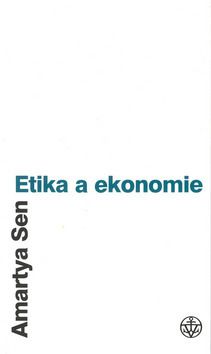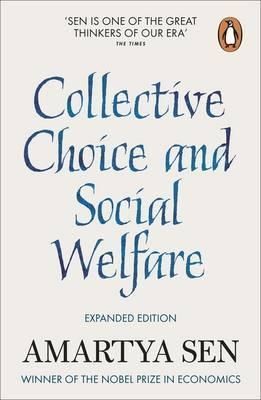Amartya Sen
autor
Etika a ekonomie
Pokus indického profesora, nositele Nobelovy ceny za ekonomii, o návrat ekonomie jako vědy k původním morálním základům. Ve třech podnětných přednáškách nazvaných Etika a ekonomie se prof. Sen snaží poukázat na význam dialogu mezi ekonomickou analýzo
u a etickým myšlením, který by byl přínosný pro obě strany. Senovy kritické úvahy v mnohém oživují komplexní přístup otce ekonomie a profesora morální filosofie, Adama Smitha. Oproti liberálním koncepcím "vlastního zájmu" zdůrazňuje Sen vnitřní hod
notu etických úvah, jež podstatným způsobem ovlivňují chování jednotlivce. Profesor Sen v roce 1998 přešel z Harvardské univerzity do Cambridge, kde se stal prvním zahraničním rektorem Trinity Colledge. Tento akademický post bývá považován za jeden z
nejprestižnějších ve Velké Británii.
Vypredané
1,13 €
1,19 €
Collective Choice and Social Welfare
Nobel Prize winner Amartya Sen's first great book, now reissued in a fully revised and expanded second edition 'Can the values which individual members of society attach to different alternatives be aggregated into values for society as a whole, in a way that is both fair and theoretically sound? Is the majority principle a workable rule for making decisions? How should income inequality be measured? When and how can we compare the distribution of welfare in different societies?' These questions, from the citation by the Swedish Academy of Sciences when Amartya Sen was awarded the Nobel Memorial Prize in Economics, refer to his work in Collective Choice and Social Welfare, the most important of all his early books. Originally published in 1970, this classic work in welfare economics has been recognized for its ground-breaking role in integrating economics and ethics, and for its influence in opening up new areas of research in social choice, including aggregative assessment. It has also had a large influence on international organizations, including the United Nations, particularly in its work on human development. In its original version, the book showed that the 'impossibility theorems' in social choice theory-led by the pioneering work of Kenneth Arrow-need not be seen as destructive of the possibility of reasoned and democratic social choice. Sen's ideas about social choice, welfare economics, inequality, poverty and human rights have continued to evolve since the book's first appearance. This expanded edition, which begins by reproducing the 1970 edition in its entirety, goes on to present eleven new chapters of new arguments and results. As in the original version, the new chapters alternate between non-mathematical chapters completely accessible to all, and those which present mathematical arguments and proofs. The reader who prefers to shun mathematics can follow all the non-mathematical chapters on their own, to receive a full, informal understanding. There is also a substantial new introduction which gives a superb overview of the whole subject of social choice.
Vypredané
15,68 €
16,50 €




